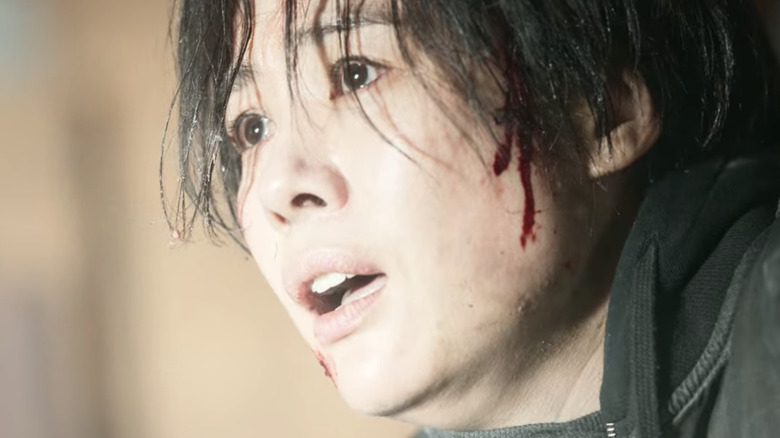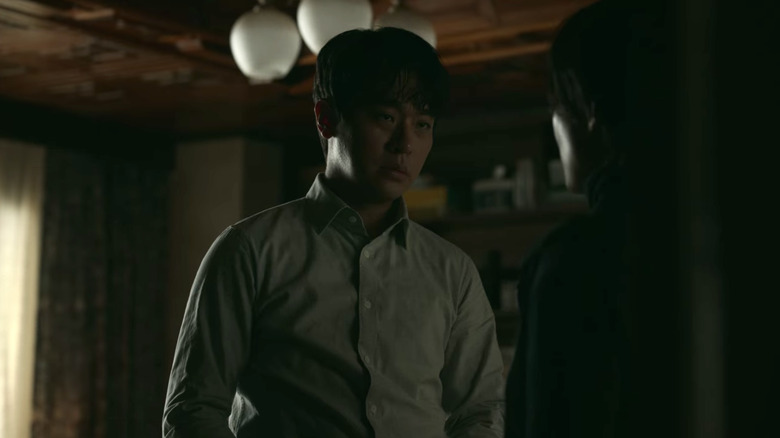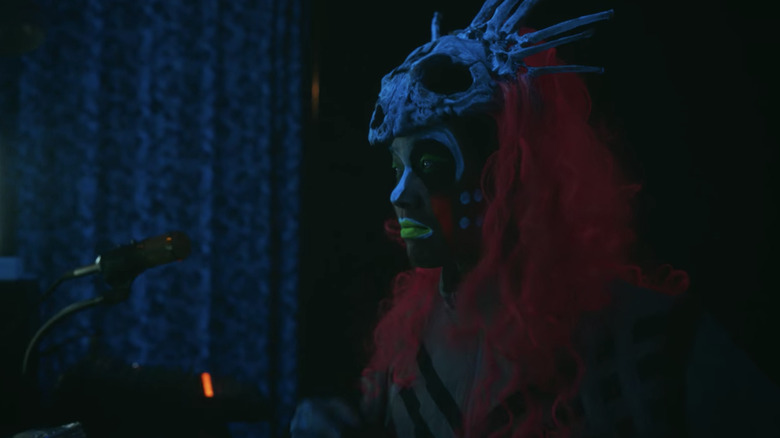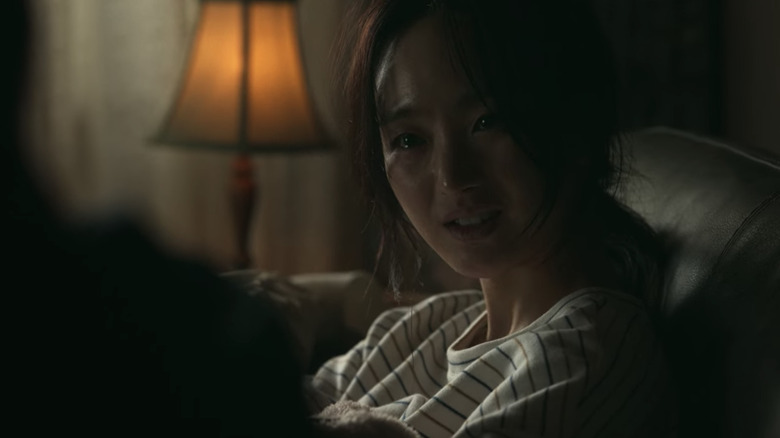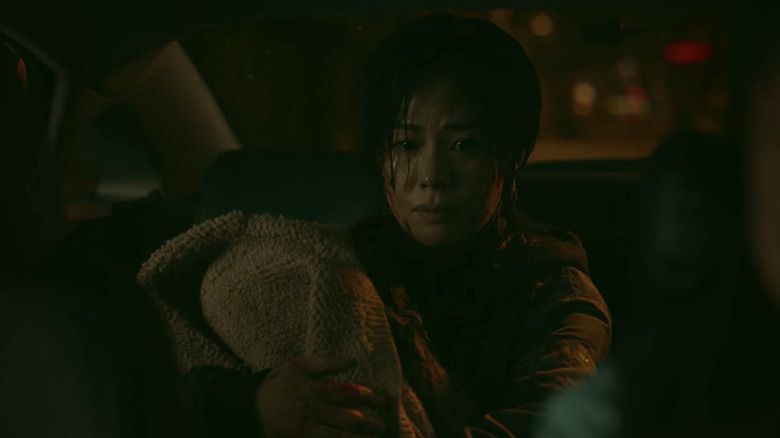Hellbound Ending Explained: Where Mob Justice Meets Self-Sacrifice
Considering the questionable visual effects that accompanied its first trailer, Netflix's "Hellbound" turned out infinitely better than it had any right to be. The series from writer Choi Kyu-sok and "Train to Busan" director Yeon Sang-ho, based on their webtoon, "The Hell," manages to overcome any misgivings about its dodgy CG angels and demons, or "Executors," to deliver an addictive six episodes that raise some thought-provoking questions about justice of both the cosmic and earthbound variety.
If you've seen the finale, then you may have some questions of your own about what just happened, not unlike the character who shouts, "The message is too complicated for me to understand! What the hell are you trying to tell me?" A time jump midway through the first season, similar to the Jude Law-led HBO series, "The Third Day," is just one example of the kind of bold storytelling moves "Hellbound" makes.
The series already has the makings of another smash-hit K-drama for Netflix. Between this show and the ever-popular "Squid Game," fans of South Korean thrillers and horror films are now discovering that those same genre pleasures extend to binge-worthy steaming titles, as well. "Hellbound" ends on a massive cliffhanger, but while we wait for the announcement of a second season, let's take a look at its twist-filled ending and everything leading up to that final reveal.
Spoilers below for "Hellbound" season 1.
Demonstrations of Damnation
In "Hellbound," people receive a decree from an angel that they are marked for death at an appointed time — and not only that, they're bound for hell, per the series title. A cult called the New Truth Society springs up around the figure of Jeong Jin-soo, played by Yoo Ah-in, an actor who became more well-known internationally after his role in the great "Burning."
Jin-soo claims that the recipients of the decree are all "sinners" who deserve the bloody punishment they receive at the hands of the monstrous Executors. He leads his followers to believe that God is making a public demonstration of people's damnation in order to scare the world straight.
The New Truth rejects the Christian doctrine of original sin, so this allows the onlookers who gather for the demonstrations and watch live broadcasts of them to think they are good people witnessing the fate of a bad person. They can retain a sense of moral superiority even as some of them splinter off into the violent Arrowhead group, which pursues its own attacks on individuals like Min Hye-jin (Kim Hyun-joo), a lawyer representing victims of the demonstrations.
The third episode of "Hellbound," however, comes with the revelation that Jin-soo himself received his own decree 20 years prior. He had not lived a life worthy of damnation, but he decided that people needed to believe the demonstrations were happening for a reason and making the world a better place, or else they would panic. The apparent senselessness of the demonstrations is further confirmed in the fourth episode, when we meet Bae Young-jae (Park Jeong-min), the father of a baby that receives the decree in the hospital. What could an innocent newborn possibly have done to warrant an immediate death sentence?
The Streamer and Mob Justice
In a series suffused with religious concepts, "Hellbound" makes a compelling statement about the way people twist religion to suit their own agenda. Instead of reacting with compassion, the New Truth and the Arrowhead assign their own divine motives to the misfortunes that befall strangers, as if the rain did not fall on the just and unjust alike. What's surprising is that the series is just as likely to have you thinking about Twitter and mob justice: the hypocritical human tendency to cast stones as if we were without sin and to make a public display of condemning people online.
The character of the Streamer, brought to life by Kim Do-yoon (who had a role in "Peninsula," the 2020 sequel to "Train to Busan") brings this theme into sharp focus. When we meet the Streamer in the first half of the series, he's in blacklight war paint, live-streaming rants that provoke his Arrowhead followers to deadly action. In the sixth episode, however, we learn that he, too, received the decree, and is now awaiting death in plainclothes.
Hye-jin brings Young-jae, his wife, Song So-hyun (Won Jin-ah), and their newborn to the Streamer's home to protect them from the New Truth, which will stop at nothing to conceal the baby's demonstration from the public, since it threatens the whole foundation of their religion. The Streamer can't understand why he himself is hellbound until he secretly phones the New Truth and they tell him what he wants to hear: namely, that God made a mistake condemning the baby and is going to use the Streamer's death five minutes later to cover it up. This appeals to his vanity and lays bare the hubris of the person who leads the rush to judgment.
A Loving Sacrifice and a Resurrection
With the Streamer now convinced he is the messiah, he dons his old war paint and starts killing people with the plan of hiding the baby's death in the five-minute interval before his own. Meanwhile, So-hyun has decided that she is going to be there with the baby until the bitter end. In a moving scene, she talks about hearing the baby cry and explains to Hye-jin that she realized it needed help and wanted to live. "It's the first time that anyone has wanted my help so badly," she says.
In the end, Young-jae and So-hyun both sacrifice themselves to save the baby. They wrap their bodies around it, and it's still there between their charred remains after the Executors have run off into the portal to Hell. This is significant: it's the first time we've seen a life spared, and it only happened because of a selfless act of love from two parents, prioritizing their child's welfare over their own. Maybe if someone altruistic had stood up for the other adult victims, those people would have been spared, too.
The Executors still return to kill the Streamer, but the baby remains alive as a miracle. When the goons of the New Truth arrive, led by Yoo Ji (Ryu Kyung-soo), the people who have witnessed this miracle finally stand up to them, enabling Hye-jin to escape with the baby. An old man calls them "pathetic crooks," and Yoo Ji responds by savagely beating him, exposing their maliciousness for all to see and getting himself arrested in the process.
'We Should Settle Our Own Affairs'
As Hye-jin rides off in the back of a taxi, the driver recognizes her and says, "I don't know much about God, and I don't even care. One thing I know for sure is that this world belongs to us. We should settle our own affairs."
"Hellbound" may feature a supernatural agent and use religious trappings to tell its story, but it's ultimately more concerned about people on Earth and how their actions help forge a just or unjust world. The characters deal with seeming acts of God, but what's scarier than any CG monsters from Hell is the human capacity for exploiting tragedies and perpetrating injustices in the name of justice.
In trying to impose a higher explanation on random events, Jin-soo wound up generating a worse kind of social chaos. That's something that is all too relevant in a year when conspiracy-filled beliefs have gained enough of a foothold to fuel insurrections. Maybe the monsters are just symbolic of the forces unleashed by the mob mentality when they take on a life of their own and go beyond anyone's control.
The final twist of "Hellbound" resets everything we think we know, as a museum display with the remains of Park Jungja (Kim Shin-rock), the second victim we ever met, becomes the site of her resurrection. She was a mother of two and it was never quite clear what her sin was, but if those who suffered eternal "damnation" are capable of coming back to life, and if a baby can be spared the fate of certain death, perhaps everything's not so hopeless, after all. In the face of existential terror, "Hellbound" offers a surprising glimpse of hope at the end and puts the onus on human beings to create a better world.
